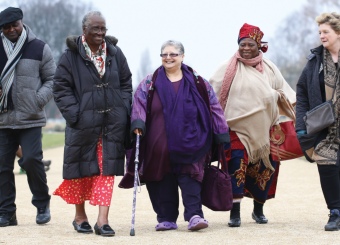Intercourse can be a taboo subject in our society – and even more so in cases involving mental health or communal care environments. Neil Allen, Senior Lecturer in Law, examines the judicial responsibility in balancing marital privacy with a patient’s vulnerability.
Pauline and Derek have been married for 50 years. He has Alzheimer’s dementia and now lives in a care home. She visits regularly. At times, sexual intimacy occurs behind Derek’s bedroom door. Often they are affectionate in communal areas. Occasionally, however, Derek doesn’t recognise his wife. The manager seeks legal advice.
Intimate and sexual relations can’t be a taboo subject because emotional and sexual health are important needs. Derek didn’t lose any of his rights when he went to a care home. And the manager should be keen to minimise the consequences of residential care on the marital relationship.
Living with and being cared for by others inevitably brings with it certain interferences not experienced in the family home. A duty of care to residents, for example; regulated care being another. Respecting the various interests of residents, care staff, and family members presents significant daily challenges for care homes.
Balancing sometimes competing rights and responsibilities can be expressed in various ways in English law. Human rights, civil law and criminal law all have something to say on the matter. Intimacy and sexual relations are the most private aspect of the right to respect for private life, guaranteed by Article 8 of the European Convention on Human Rights. Sexual freedom is important; but so too is one’s right to be free from sexual exploitation and abuse. And one of the mutual aims of both the civil and criminal law is to protect the vulnerable.
If Derek lacks the capacity to consent to sexual relations, the Mental Capacity Act 2005 and the Sexual Offences Act 2003 have the effect of rendering him asexual. No-one can consent on his behalf and intercourse with those lacking capacity to consent is a criminal offence. There are no spousal or other exceptions.
The judiciary tend to see decisions about sex and contact as separate decisions: Derek could have capacity to decide to have sex, but lack capacity to decide with whom he has it. The former focuses on the mechanics, sexual health risks, risk of pregnancy (if relevant), and the element of choice. Contact decisions, however, can be more complicated, and best-interest decisions are available if the person is unable to decide.
So if Derek had sexual capacity but lacked contact capacity, walking this judicial tightrope would mean that a judge could, if need be, regulate contact between the couple, but not interfere with what happens behind the bedroom door. However, whether it is right to separate these decisions is a legitimate question, as sex involves contact.
Simply talking about the ‘S’ word challenges the taboo. We need not be prudish about it – but we must be prudent. And the more we talk about it, the more ideas will flow to help inform the law so as to strike that balance between sexual freedom and being free from sexual exploitation.
Neil Allen, Barrister (Middle Temple) and Senior Lecturer in the University’s Department of Law.
Find out more about our Department of Law.





